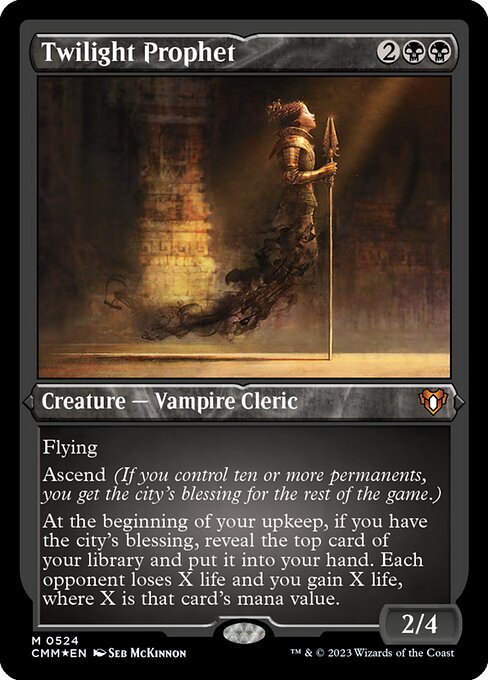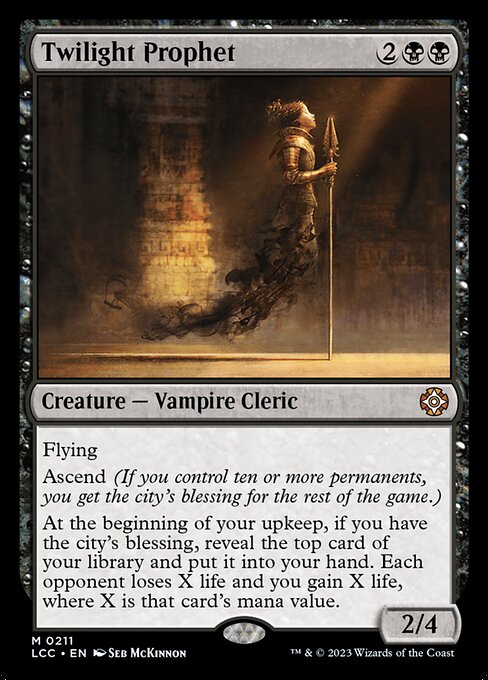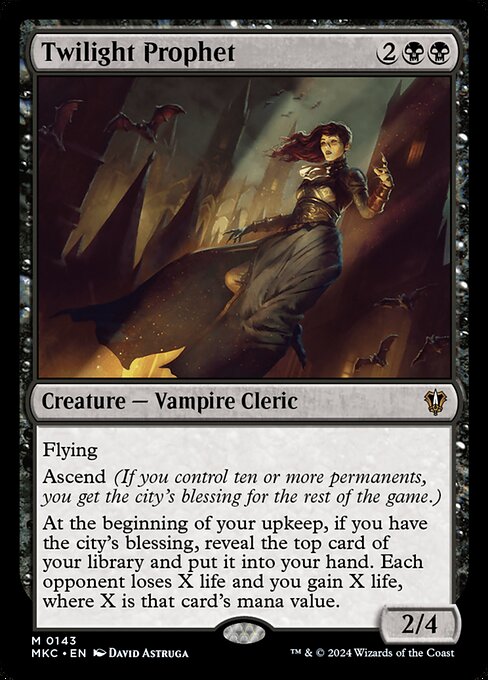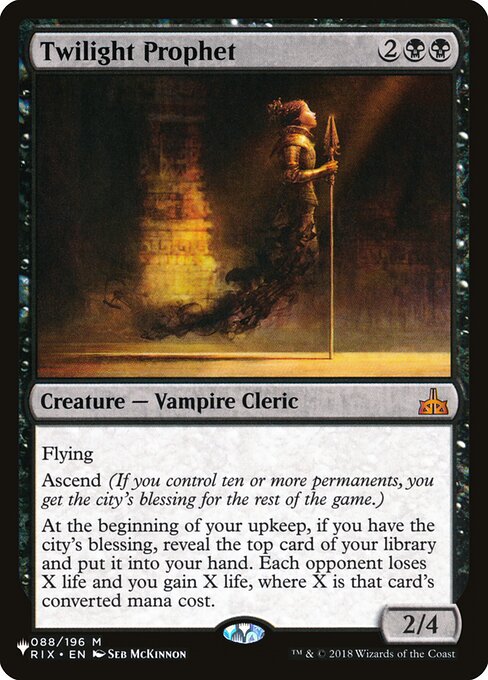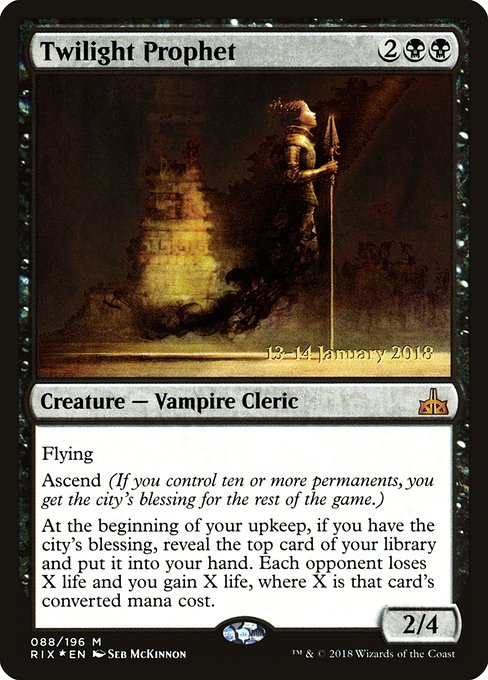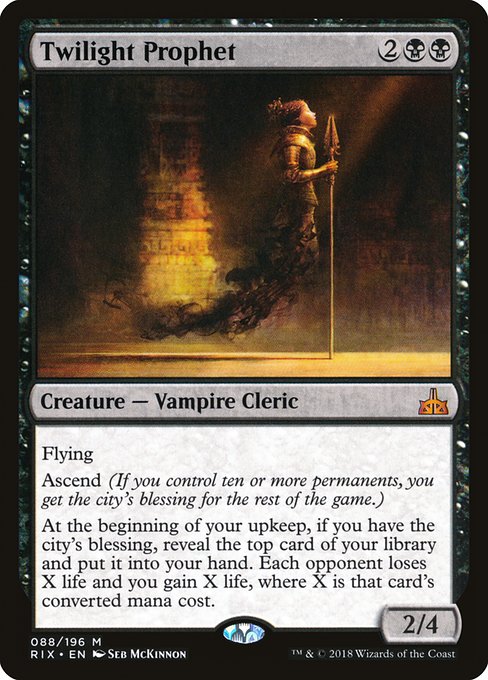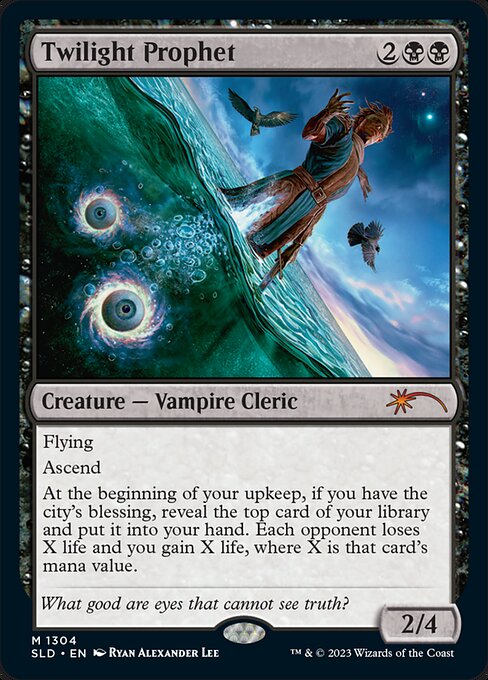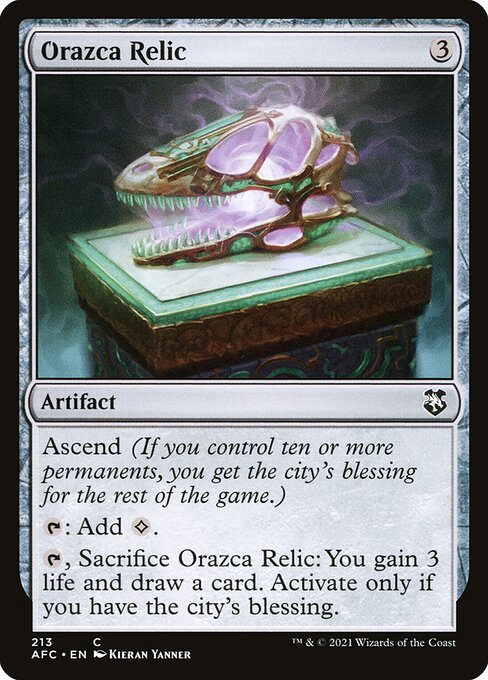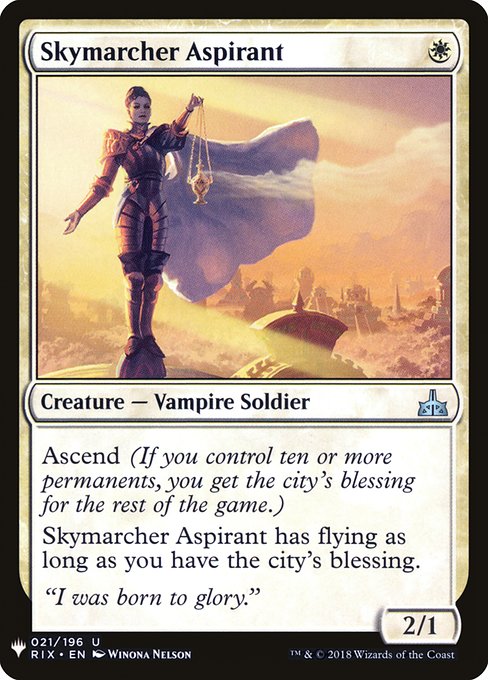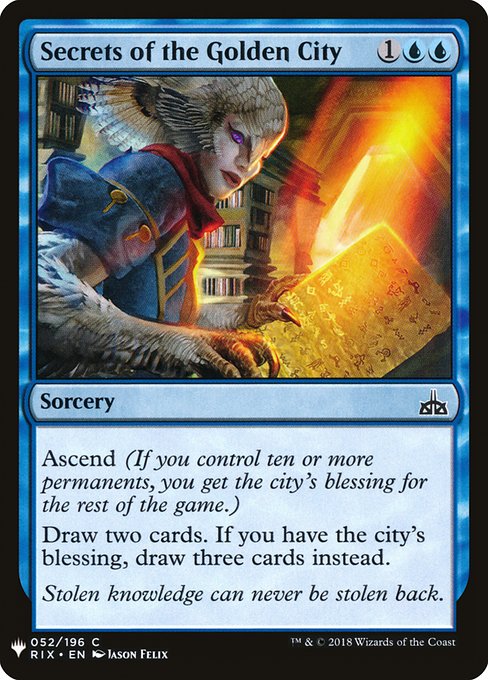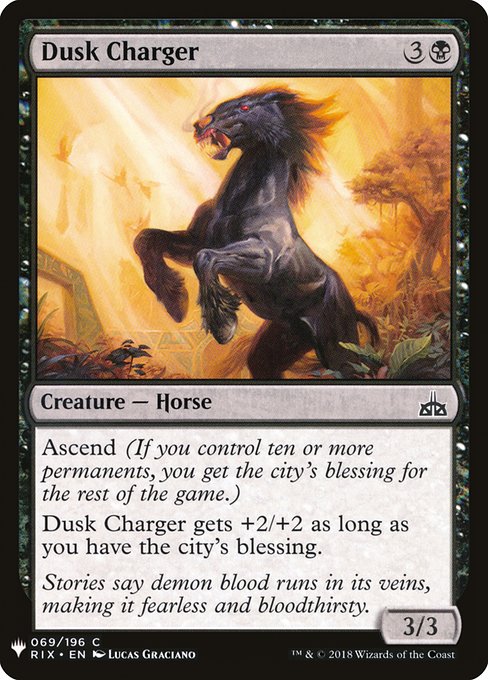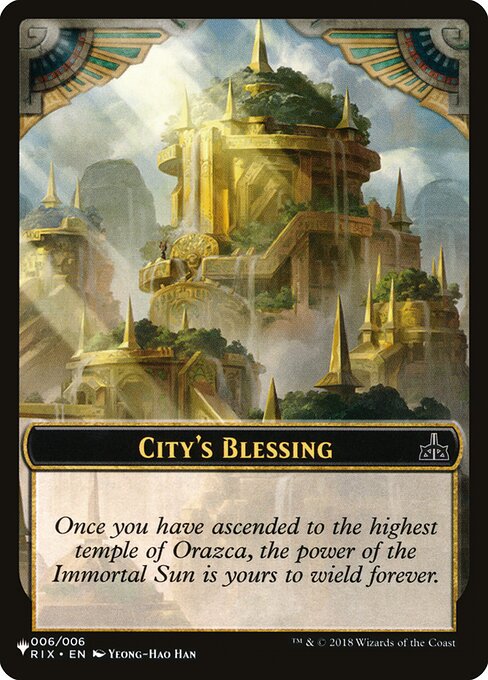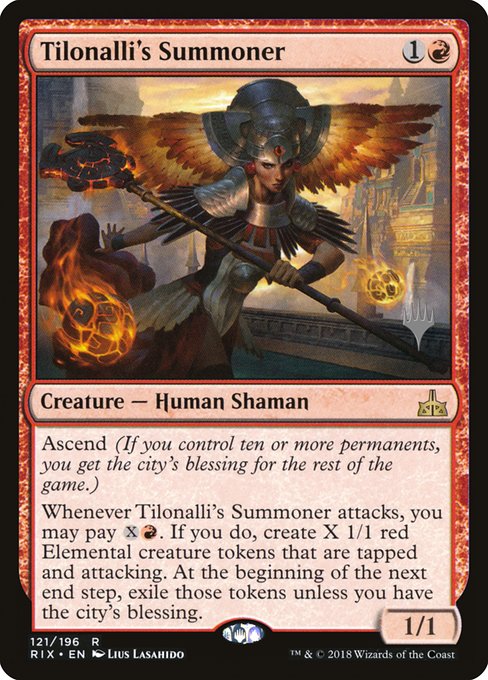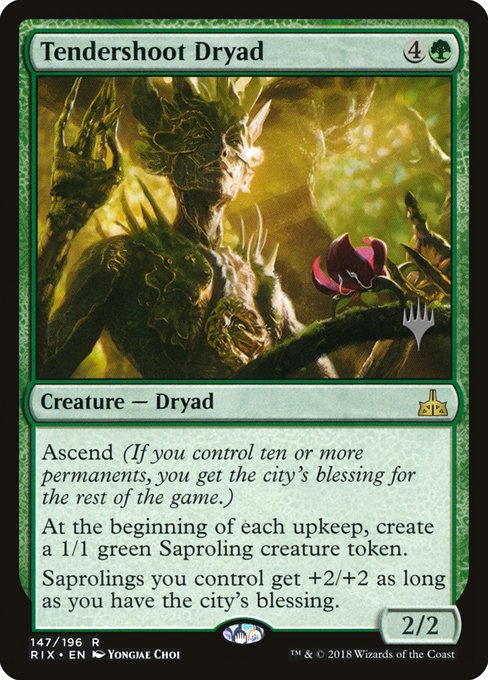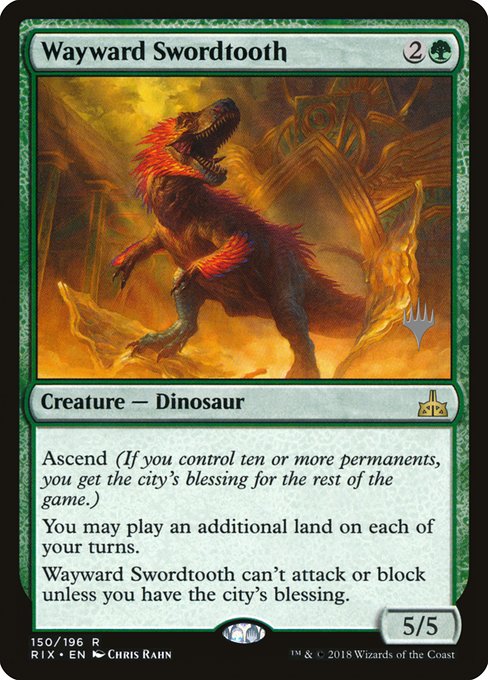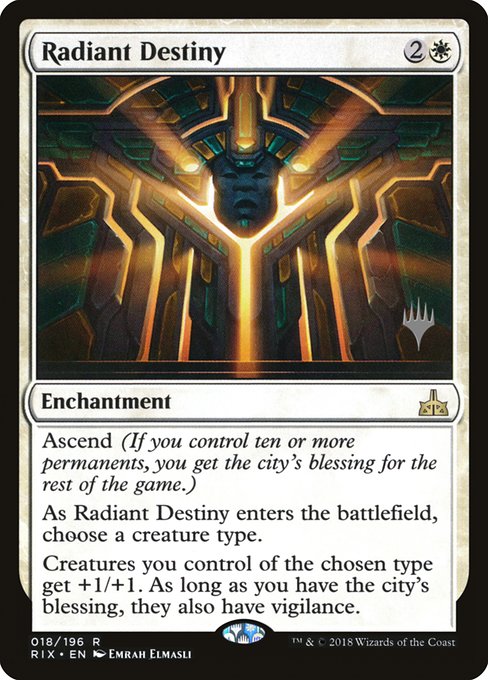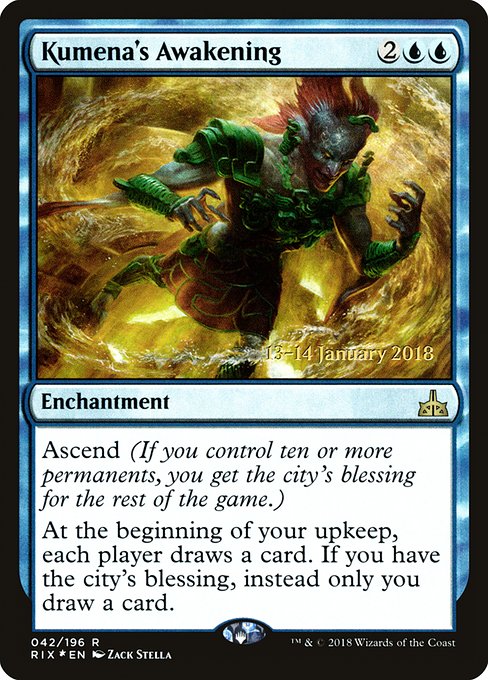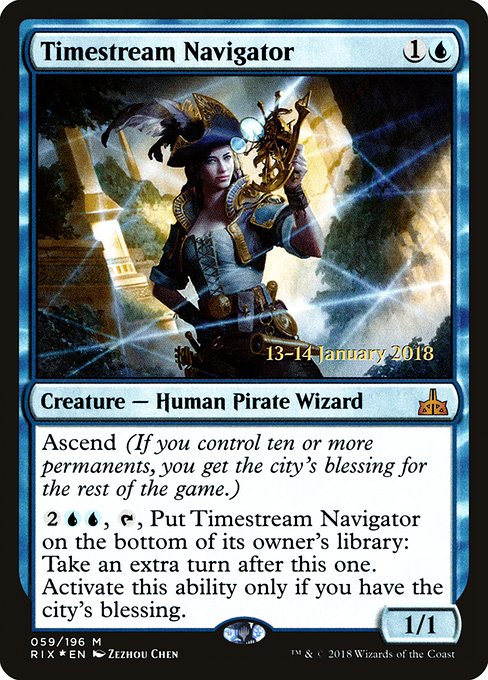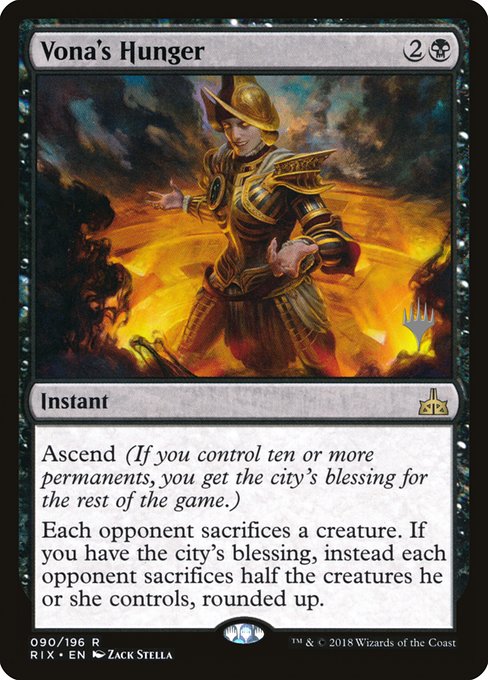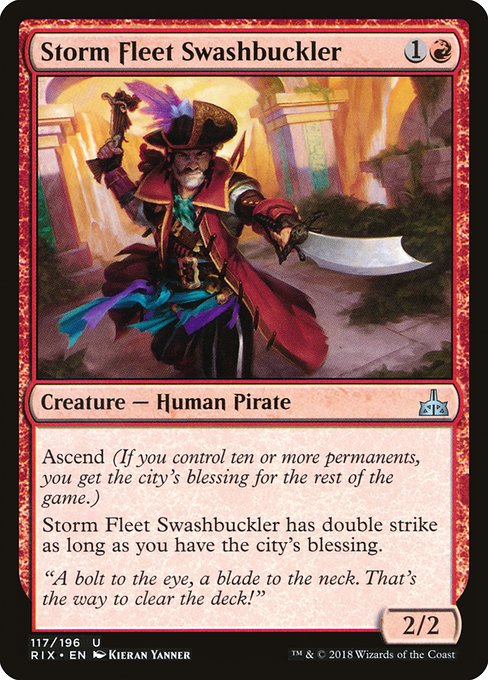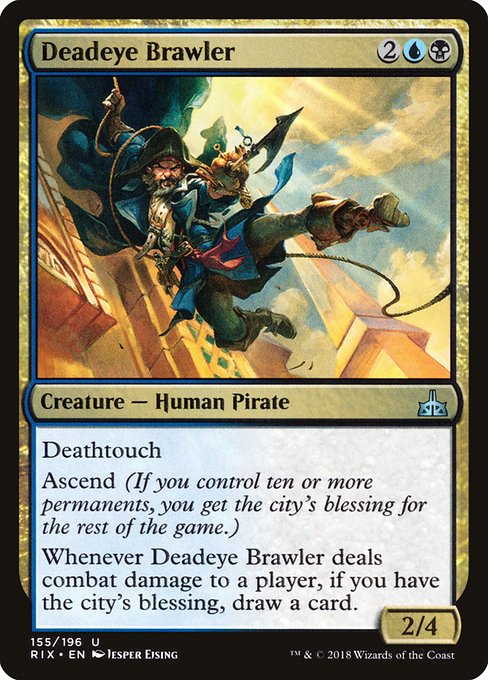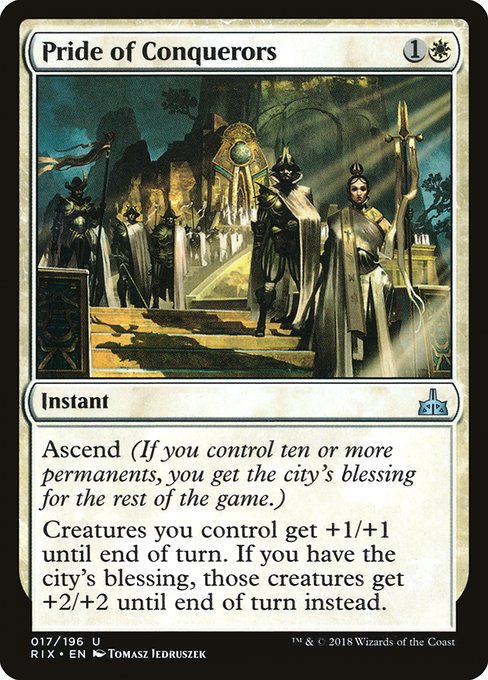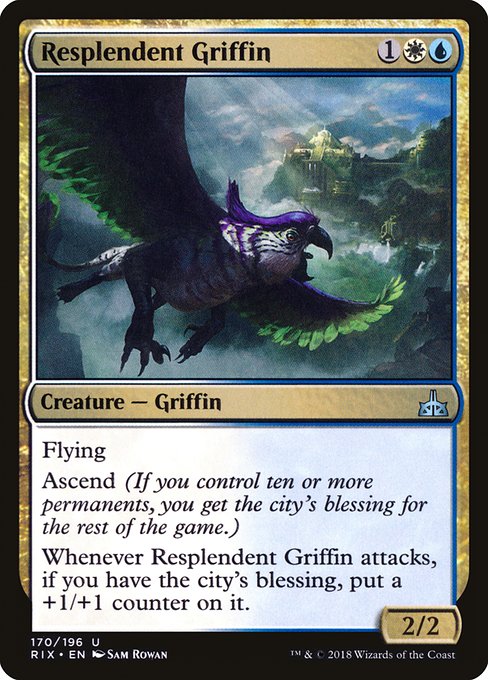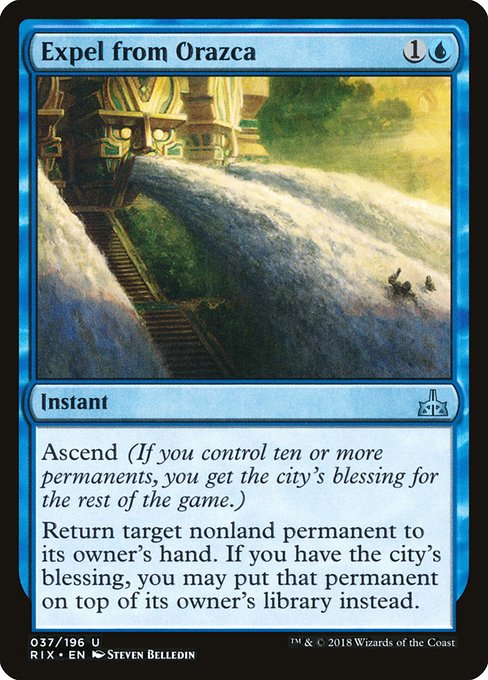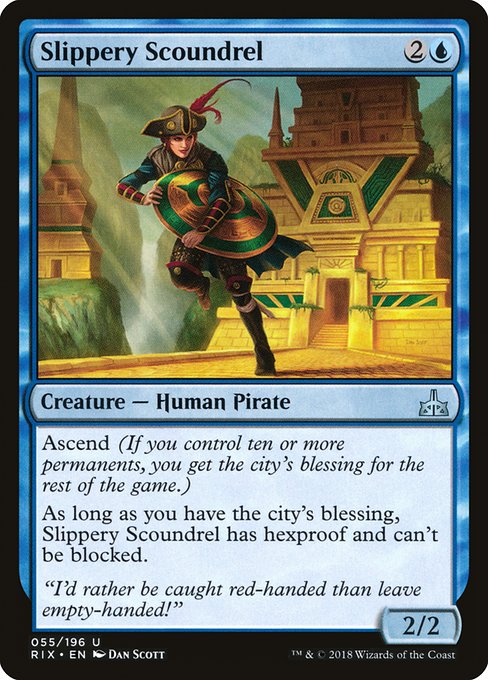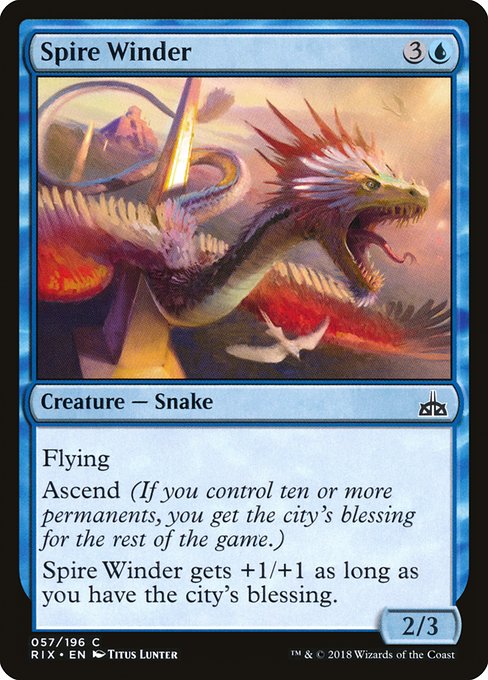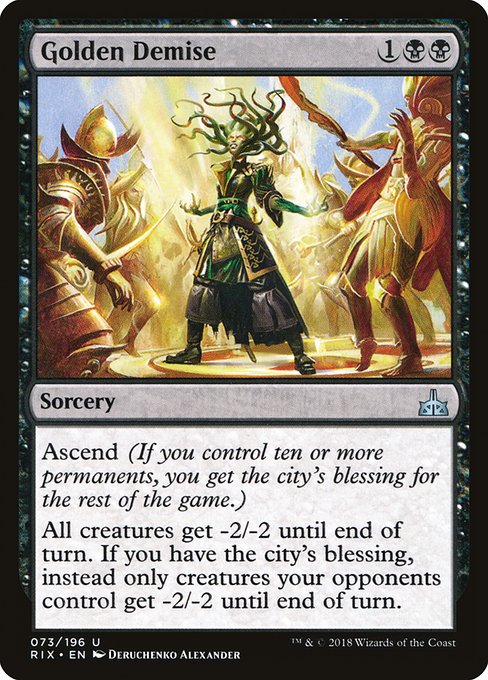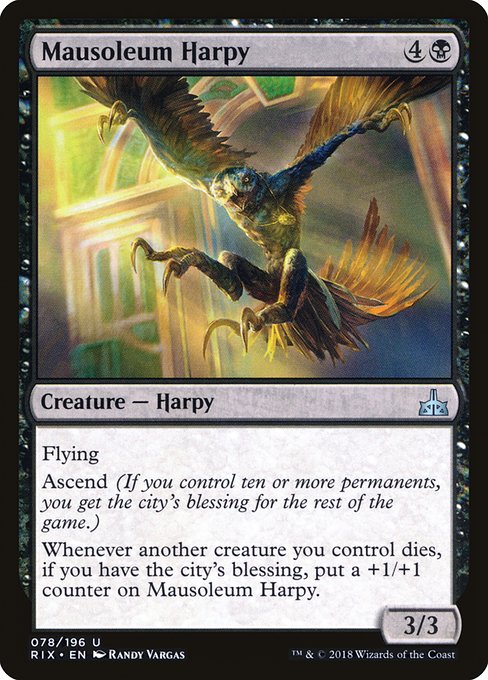Prophetin der Dämmerung
Kreatur — Vampir, Kleriker
Fliegend
Aufstieg (Falls du zehn oder mehr bleibende Karten kontrollierst, erhältst du für den Rest der Partie den Segen der Stadt.)
Zu Beginn deines Versorgungssegments und falls du den Segen der Stadt hast, decke die oberste Karte deiner Bibliothek auf und nimm sie auf deine Hand. Jeder Gegner verliert X Lebenspunkte und du erhältst X Lebenspunkte dazu, wobei X gleich den umgewandelten Manakosten der aufgedeckten Karte ist.
Aufstieg (Falls du zehn oder mehr bleibende Karten kontrollierst, erhältst du für den Rest der Partie den Segen der Stadt.)
Zu Beginn deines Versorgungssegments und falls du den Segen der Stadt hast, decke die oberste Karte deiner Bibliothek auf und nimm sie auf deine Hand. Jeder Gegner verliert X Lebenspunkte und du erhältst X Lebenspunkte dazu, wobei X gleich den umgewandelten Manakosten der aufgedeckten Karte ist.
2/4
standard
future
historic
gladiator
pioneer
explorer
modern
legacy
pauper
vintage
penny
commander
brawl
alchemy
paupercommander
duel
oldschool
premodern
Rulings
Ascend on a permanent isn’t a triggered ability and doesn’t use the stack. Players can respond to a spell that will give you your tenth permanent, but they can’t respond to getting the city’s blessing once you control that tenth permanent. This means that if your tenth permanent is a land you play, players can’t respond before you get the city’s blessing.
A permanent is any object on the battlefield, including tokens and lands. Spells and emblems aren’t permanents.
In a Two-Headed Giant game, Twilight Prophet’s last ability causes the opposing team to lose twice X life and you gain X life.
Once you have the city’s blessing, you have it for the rest of the game, even if you lose control of some or all of your permanents. The city’s blessing isn’t a permanent itself and can’t be removed by any effect.
If you control ten permanents but don’t control a permanent or resolving spell with ascend, you don’t get the city’s blessing. For example, if you control ten permanents, lose control of one, then cast Golden Demise, you won’t have the city’s blessing and the spell will affect creatures you control.
The converted mana cost of a split card, such as cards with aftermath from the Amonkhet block, is based on the combined mana cost of its two halves.
If your tenth permanent enters the battlefield and then a permanent leaves the battlefield immediately afterwards (most likely due to the “Legend Rule” or due to being a creature with 0 toughness), you get the city’s blessing before it leaves the battlefield.
If the revealed card doesn’t have a mana cost (because it’s a land card, for example), its converted mana cost is 0.
Some cards have triggered abilities with an intervening “if” clause that checks whether you have the city’s blessing. These are worded “[Trigger condition], if you have the city’s blessing, [effect].” You must already have the city’s blessing in order for these abilities to trigger; otherwise they do nothing. In other words, there’s no way to have the ability trigger if you don’t have the city’s blessing, even if you intend to get it in response to the triggered ability.
If the mana cost of the revealed card includes , X is considered to be 0.
If you cast a spell with ascend, you don’t get the city’s blessing until it resolves. Players may respond to that spell by trying to change whether you get the city’s blessing.
A permanent is any object on the battlefield, including tokens and lands. Spells and emblems aren’t permanents.
In a Two-Headed Giant game, Twilight Prophet’s last ability causes the opposing team to lose twice X life and you gain X life.
Once you have the city’s blessing, you have it for the rest of the game, even if you lose control of some or all of your permanents. The city’s blessing isn’t a permanent itself and can’t be removed by any effect.
If you control ten permanents but don’t control a permanent or resolving spell with ascend, you don’t get the city’s blessing. For example, if you control ten permanents, lose control of one, then cast Golden Demise, you won’t have the city’s blessing and the spell will affect creatures you control.
The converted mana cost of a split card, such as cards with aftermath from the Amonkhet block, is based on the combined mana cost of its two halves.
If your tenth permanent enters the battlefield and then a permanent leaves the battlefield immediately afterwards (most likely due to the “Legend Rule” or due to being a creature with 0 toughness), you get the city’s blessing before it leaves the battlefield.
If the revealed card doesn’t have a mana cost (because it’s a land card, for example), its converted mana cost is 0.
Some cards have triggered abilities with an intervening “if” clause that checks whether you have the city’s blessing. These are worded “[Trigger condition], if you have the city’s blessing, [effect].” You must already have the city’s blessing in order for these abilities to trigger; otherwise they do nothing. In other words, there’s no way to have the ability trigger if you don’t have the city’s blessing, even if you intend to get it in response to the triggered ability.
If the mana cost of the revealed card includes , X is considered to be 0.
If you cast a spell with ascend, you don’t get the city’s blessing until it resolves. Players may respond to that spell by trying to change whether you get the city’s blessing.
Rulings
Ascend on a permanent isn’t a triggered ability and doesn’t use the stack. Players can respond to a spell that will give you your tenth permanent, but they can’t respond to getting the city’s blessing once you control that tenth permanent. This means that if your tenth permanent is a land you play, players can’t respond before you get the city’s blessing.
A permanent is any object on the battlefield, including tokens and lands. Spells and emblems aren’t permanents.
In a Two-Headed Giant game, Twilight Prophet’s last ability causes the opposing team to lose twice X life and you gain X life.
Once you have the city’s blessing, you have it for the rest of the game, even if you lose control of some or all of your permanents. The city’s blessing isn’t a permanent itself and can’t be removed by any effect.
If you control ten permanents but don’t control a permanent or resolving spell with ascend, you don’t get the city’s blessing. For example, if you control ten permanents, lose control of one, then cast Golden Demise, you won’t have the city’s blessing and the spell will affect creatures you control.
The converted mana cost of a split card, such as cards with aftermath from the Amonkhet block, is based on the combined mana cost of its two halves.
If your tenth permanent enters the battlefield and then a permanent leaves the battlefield immediately afterwards (most likely due to the “Legend Rule” or due to being a creature with 0 toughness), you get the city’s blessing before it leaves the battlefield.
If the revealed card doesn’t have a mana cost (because it’s a land card, for example), its converted mana cost is 0.
Some cards have triggered abilities with an intervening “if” clause that checks whether you have the city’s blessing. These are worded “[Trigger condition], if you have the city’s blessing, [effect].” You must already have the city’s blessing in order for these abilities to trigger; otherwise they do nothing. In other words, there’s no way to have the ability trigger if you don’t have the city’s blessing, even if you intend to get it in response to the triggered ability.
If the mana cost of the revealed card includes , X is considered to be 0.
If you cast a spell with ascend, you don’t get the city’s blessing until it resolves. Players may respond to that spell by trying to change whether you get the city’s blessing.
A permanent is any object on the battlefield, including tokens and lands. Spells and emblems aren’t permanents.
In a Two-Headed Giant game, Twilight Prophet’s last ability causes the opposing team to lose twice X life and you gain X life.
Once you have the city’s blessing, you have it for the rest of the game, even if you lose control of some or all of your permanents. The city’s blessing isn’t a permanent itself and can’t be removed by any effect.
If you control ten permanents but don’t control a permanent or resolving spell with ascend, you don’t get the city’s blessing. For example, if you control ten permanents, lose control of one, then cast Golden Demise, you won’t have the city’s blessing and the spell will affect creatures you control.
The converted mana cost of a split card, such as cards with aftermath from the Amonkhet block, is based on the combined mana cost of its two halves.
If your tenth permanent enters the battlefield and then a permanent leaves the battlefield immediately afterwards (most likely due to the “Legend Rule” or due to being a creature with 0 toughness), you get the city’s blessing before it leaves the battlefield.
If the revealed card doesn’t have a mana cost (because it’s a land card, for example), its converted mana cost is 0.
Some cards have triggered abilities with an intervening “if” clause that checks whether you have the city’s blessing. These are worded “[Trigger condition], if you have the city’s blessing, [effect].” You must already have the city’s blessing in order for these abilities to trigger; otherwise they do nothing. In other words, there’s no way to have the ability trigger if you don’t have the city’s blessing, even if you intend to get it in response to the triggered ability.
If the mana cost of the revealed card includes , X is considered to be 0.
If you cast a spell with ascend, you don’t get the city’s blessing until it resolves. Players may respond to that spell by trying to change whether you get the city’s blessing.
Votre collection ? vos decks ?
Envie de gérer votre collection et/ou créer des decks ?
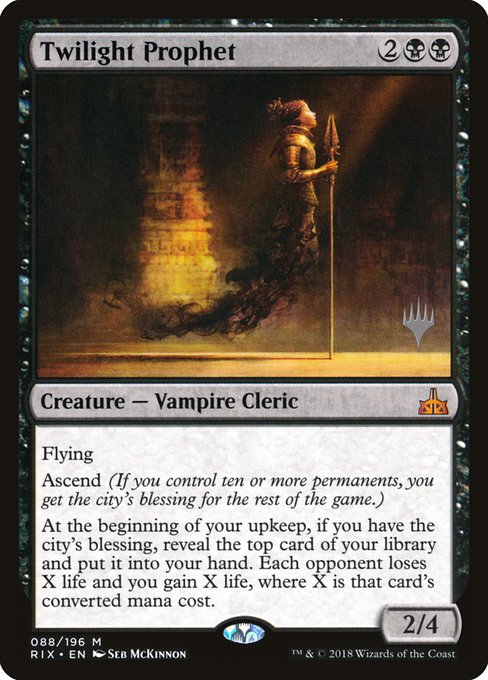

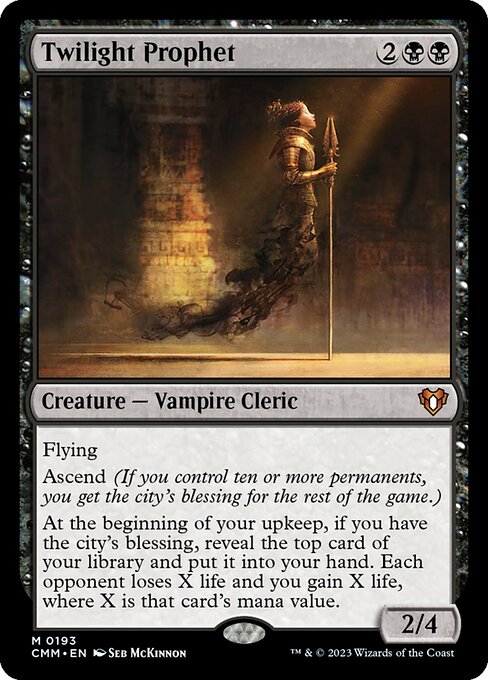
 0
0
 1.91€
1.91€
